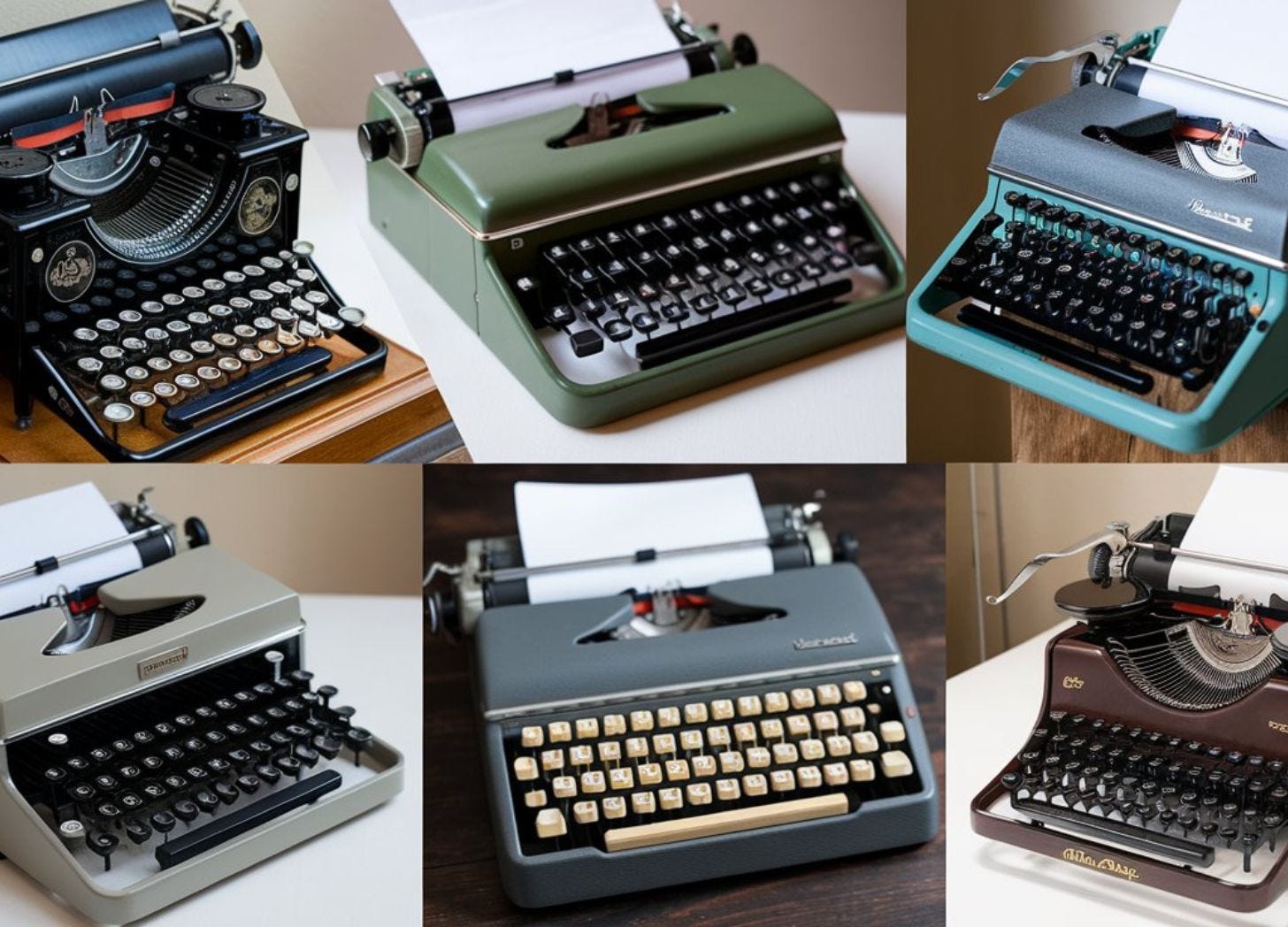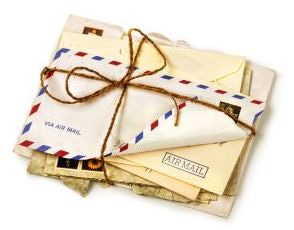What Is It About Typewriters?
For over a century, these beautiful machines have fascinated us.
If you’d prefer to listen instead of read this post:
There’s something unquestionably nostalgic and intriguing about typewriters. With their rhythmic clatter and tactile charm, these machines evoke a bygone era of slower, more deliberate communication. Even as computer keyboards have invaded every office, typewriters continue to captivate writers, collectors, and enthusiasts alike. At a recent gathering of local authors, one of the participants brought her manual Hermes Baby Featherweight from the 1930s. We were all fascinated and begged to type on it.
So why do typewriters still hold such fascination for us?
A Brief History of the Typewriter
The first commercially successful typewriter, the Sholes and Glidden Type Writer, was introduced in 1874. It featured the now-familiar QWERTY keyboard, designed to prevent typebar jams by spacing out commonly used letters. Over the decades, typewriters evolved into sleek, efficient tools for personal and professional writing. They dominated offices and homes until computers began to take over in the late 20th century.
My mother and I learned to type one summer when I was in high school. We taught ourselves with a book called Touch Typing in Ten Lessons by Ruth Ben’Ary. Her technique is still used and referred to as the Ben’Ary Method. I made good spending money in college by typing term papers for other students.
Why We Still Love Them
The Sensory Experience
Unlike today’s silent keyboards, typewriters engage all the senses. There’s the feel of the keys, the satisfying sound of each letter striking the page, and even the smell of inked ribbons and paper. Writing on a typewriter is an immersive experience that makes every word seem more significant.A Symbol of Creativity
For many, typewriters are associated with the romanticized image of the writer—a solitary figure hammering away at a novel or poem. Greats like Ernest Hemingway and Agatha Christie famously used them, and their association with literary genius adds to their allure.A Testament to Durability
Typewriters are built to last. Quite a few vintage models are still functional decades after their manufacture, unlike today’s disposable gadgets. Their mechanical simplicity and durability are part of their enduring appeal. Check out the array offered on Amazon.A Bridge to Simplicity
Distractions are everywhere, but typewriters offer a refreshing reprieve. They force you to focus on the task at hand—no pop-up notifications, no editing as you go. This may be behind the resurgence in their use among writers seeking a purer connection with their words. My friend who owns the Hermes Featherweight says it slows her down so that her brain can process what she wants to say before she types them on paper.The Personal Touch
Typed notes and letters have a unique character. Slight imperfections—uneven ink or misaligned letters—make them seem more personal and irreplaceable. They convey effort, thoughtfulness, and care. I have a treasured stack of typed letters from my paternal grandfather. See “The 1957 Letter That Encouraged Me To Write.”
Fun Tidbits About Typewriters
The longest word you can type using only the top row of a QWERTY keyboard is "typewriter."
Tom Hanks is a well-known typewriter enthusiast with an extensive collection. He even co-created an app, Hanx Writer, to simulate the experience on a tablet.
The Guinness World Record for fastest typist, Barbara Blackburn, achieved speeds of 150 words per minute on a manual typewriter.
Typewriters may no longer be a necessity, but they’ve become timeless icons. They remind us of a period when writing was more tactile and intentional, and they inspire us to slow down and savor the art of communication. So, if you’re lucky enough to own a typewriter that’s stashed in the back of a closet somewhere—or know someone else who does—consider giving it a try. Their magic doesn’t just lie in the past but in what they still are: tools that connect us to the heart of the written word.
And those words can be heartspoken!
What’s your favorite memory of a typewriter? Share it in the comments—I’d love to hear your story!
Next week
Don’t miss these tips on how to turn the ordinary details of your life into a letter your recipient will love reading. Subscribe now so you don’t miss it:
Have a great week and always remember: whether written or spoken, words from the heart will never fail you!
P.S. Don’t miss the RV Book Fair from Relatable Media through Nov. 23rd — I’m a speaker, presenter, and panel member, and it’s all FREE! Click the button to get the details.








Reading your post, my heart was gripped by a longing for the touch of the qwerty keys of my youth-the clunky Royal of my 10th grade typing class, the automatic miracle of the first IBM Selectric, the forgiving memory-save of my little tabletop word processor (1991?). It could save an entire page of resume without mistakes or typos! With the press of a single key, it amazed family and friends acting like a player piano typing out its little ditty unaided.
Thank you Elizabeth, you have given me a quest and a target for scouring old antique shops.
I learned to type on my mom's manual typewriter. She was a journalist and columnist and owned several gigantic typewriters. They were so huge and heavy and hard to use, we let them go in the auction when we sold all their belongings and the farm on the same painful day. I still feel a twinge of regret. The one typewriter I kept was the "portable" typewriter (it still weighs a lot) Mom lugged around her college campus in the 1950s.
You might also like John Green's essay about the QWERTY keyboard from The Anthropocene Reviewed (the essay offers the history of the keyboard weaving with John's history with the keyboard). I connect with what he wrote: "The keyboard is my path to having thoughts, and also my path to sharing them. I can’t play an instrument, but I can bang on this literary piano, and when it’s going well, a certain percussive rhythm develops. Sometimes—not every day, certainly, but sometimes—knowing where the letters are allows me to feel like I know where the words are."
https://www.wnycstudios.org/podcasts/anthropocene-reviewed/episodes/anthropocene-reviewed-qwerty-keyboard-and-kauai-o-o?tab=transcript